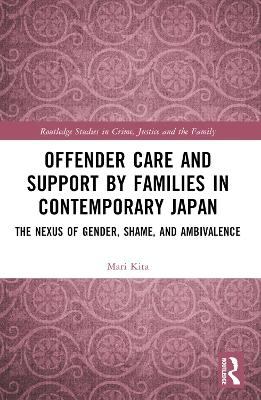
Offender Care and Support by Families in Contemporary Japan
The Nexus of Gender, Shame, and Ambivalence
Seiten
2024
Routledge (Verlag)
978-0-367-65442-9 (ISBN)
Routledge (Verlag)
978-0-367-65442-9 (ISBN)
- Lieferbar (Termin unbekannt)
- Versandkostenfrei
- Auch auf Rechnung
- Artikel merken
Because people’s contact with the criminal justice system comes in different shapes and forms, scholars are now broadening their analytical scope and examining the overall repercussions of criminal justice contact on families of offenders. Compared to Western societies, Japan is known for its lower crime rates and more pronounced use of informal social control. Thus, it offers a useful research site for examining how families in a low-crime society experience criminal justice contact and how they function as an integral part of the nation’s crime control mechanism.
This book considers the role of the family in the lives of offenders and the criminal justice system in Japan. Looking particularly at gender and patriarchal power relations, it reveals how cultural notions of femininity prompt the criminal justice system to rely on women as its proxy. This book explores how families of offenders often step in to fill the voids left by criminal justice institutions and social services to provide offenders with all-inclusive care. The burden of supervising and rehabilitating offenders on top of the expectation to atone for the crimes also renders families ambivalent and ashamed. Whereas the state and criminal justice authorities tend to see offenders’ families as a crucial resource for prisoner reentry, this book highlights the necessity for addressing families’ needs before automatically assuming their support. It also pushes the boundaries of feminist criminology by showing how women can be affected by male criminality and male-dominated criminal justice institutions, other than as victims and offenders.
An accessible and compelling read, this book will appeal to students and scholars of criminology, sociology, gender studies, Japanese culture and all those interested in learning more about the criminal justice system in Japan.
This book considers the role of the family in the lives of offenders and the criminal justice system in Japan. Looking particularly at gender and patriarchal power relations, it reveals how cultural notions of femininity prompt the criminal justice system to rely on women as its proxy. This book explores how families of offenders often step in to fill the voids left by criminal justice institutions and social services to provide offenders with all-inclusive care. The burden of supervising and rehabilitating offenders on top of the expectation to atone for the crimes also renders families ambivalent and ashamed. Whereas the state and criminal justice authorities tend to see offenders’ families as a crucial resource for prisoner reentry, this book highlights the necessity for addressing families’ needs before automatically assuming their support. It also pushes the boundaries of feminist criminology by showing how women can be affected by male criminality and male-dominated criminal justice institutions, other than as victims and offenders.
An accessible and compelling read, this book will appeal to students and scholars of criminology, sociology, gender studies, Japanese culture and all those interested in learning more about the criminal justice system in Japan.
Mari Kita is an Assistant Professor of Sociology at the Department of Sociology, Anthropology, and Criminology at Eastern Illinois University. She graduated with a Ph.D. from the University of Hawaii at Manoa in 2018. Her areas of interest include feminist criminology, crime and punishment in Japan, and criminological ethnography. She was born and raised in Tokyo, Japan.
1.Introduction 2.Researching Offenders’ Families in Japan 3."They Come in the Morning, the Police" 4.Gendered Acts of Offender Care and Support 5.Shame and Stigma 6.Ambivalence 7.Reform Implications and a Consideration for Patriarchy 8.Conclusions
| Erscheinungsdatum | 06.09.2023 |
|---|---|
| Reihe/Serie | Routledge Studies in Crime, Justice and the Family |
| Zusatzinfo | 2 Tables, black and white; 1 Line drawings, black and white; 1 Illustrations, black and white |
| Verlagsort | London |
| Sprache | englisch |
| Maße | 156 x 234 mm |
| Themenwelt | Sachbuch/Ratgeber ► Gesundheit / Leben / Psychologie ► Familie / Erziehung |
| Recht / Steuern ► EU / Internationales Recht | |
| Recht / Steuern ► Strafrecht ► Kriminologie | |
| Recht / Steuern ► Strafrecht ► Strafverfahrensrecht | |
| Sozialwissenschaften ► Soziologie ► Mikrosoziologie | |
| ISBN-10 | 0-367-65442-3 / 0367654423 |
| ISBN-13 | 978-0-367-65442-9 / 9780367654429 |
| Zustand | Neuware |
| Informationen gemäß Produktsicherheitsverordnung (GPSR) | |
| Haben Sie eine Frage zum Produkt? |
Mehr entdecken
aus dem Bereich
aus dem Bereich
spielerisch bis zum ersten Schritt
Buch | Softcover (2024)
Urban & Fischer in Elsevier (Verlag)
CHF 46,15
Born to be wild: Wie die Evolution unsere Kinder prägt. Mit einem …
Buch | Hardcover (2022)
Kösel (Verlag)
CHF 33,90
das Standardwerk für die ersten 12 Monate
Buch | Hardcover (2023)
Gräfe und Unzer (Verlag)
CHF 51,90


